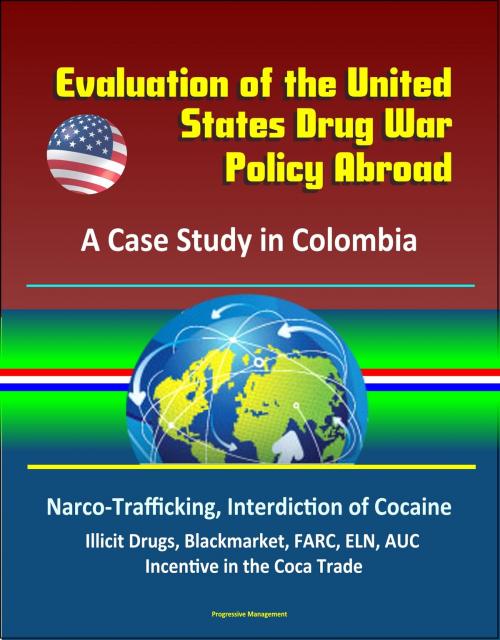Evaluation of the United States Drug War Policy Abroad: A Case Study in Colombia - Narco-Trafficking, Interdiction of Cocaine, Illicit Drugs, Blackmarket, FARC, ELN, AUC, Incentive in the Coca Trade
Nonfiction, History, Americas, South America, Social & Cultural Studies, True Crime| Author: | Progressive Management | ISBN: | 9781311948007 |
| Publisher: | Progressive Management | Publication: | May 23, 2016 |
| Imprint: | Smashwords Edition | Language: | English |
| Author: | Progressive Management |
| ISBN: | 9781311948007 |
| Publisher: | Progressive Management |
| Publication: | May 23, 2016 |
| Imprint: | Smashwords Edition |
| Language: | English |
This excellent report has been professionally converted for accurate flowing-text e-book format reproduction. As the United States continues to recover from the greatest recession since the Great Depression, the U.S. government must find cost savings. Therefore, this project aimed to find efficiencies through reallocating funds from a program proven ineffective. U.S. foreign aid programs such as Plan Colombia, in conjunction with Colombian President Uribe's "Democratic Security" strategy, caused a significant drop in murder rates, the number of displaced people, and the number of kidnappings in Colombia over the last ten years. The purpose of beginning the drug war in Colombia was to interdict the drugs at the source. However, as a result of the "balloon effect" into Peru and Bolivia and technological advances by the narco-traffickers, the net result of interdiction has been virtually zero. Additionally, the source of the United States' drug problem is not in Colombia, but with the user and his or her demand for illicit drugs. Therefore, this project recommends aligning funding to support rehabilitation and prevention programs that will reduce the likelihood that a person will have the desire to abuse drugs again. Though there are possibly negative short-term effects of this policy, this project shows that the long-term effect favors rehabilitation and prevention.
CHAPTER I - INTRODUCTION * A. UNITED STATES' RETURN ON INVESTMENT * B. COLOMBIA'S RETURN ON INVESTMENT * C. DANGER OF BLACK MARKET INFLUENCES ON COCAINE * D. COLOMBIA AS A STRATEGIC ALLY * E. CONCLUSION * CHAPTER II - HISTORY OF UNITED STATES INVOLVEMENT IN COLOMBIA * A. HISTORY OF FOREIGN POLICY FOR LATIN AMERICA * B. FOREIGN AID IN LATIN AMERICA AS A NATIONAL STRATEGY * C. HISTORY OF VIOLENCE: LA VIOLENCIA * 1. Struggle for Power * 2. Weak Military * 3. Strategic Importance of Colombia * D. PLAN COLOMBIA * CHAPTER III - HISTORY OF THE WAR ON DRUGS * A. HISTORY OF THE DRUG WAR FROM 1900 TO NIXON YEARS * B. HISTORY OF THE DRUG WAR FROM NIXON TO PRESENT * CHAPTER IV - COST TO COLOMBIA * A. SECURITY ISSUES * 1. Colombia's Illegal Drug Firms * 2. Revolutionary Armed Forces of Columbia (FARC) * 3. National Liberation Army (ELN) * 4. United Self-Defense Force of Colombia (AUC) * B. INVESTMENT BY THE COLOMBIAN GOVERNMENT * C. DISPLACED PERSONS * D. INCENTIVE IN THE COCA TRADE * E. AIRCRAFT * F. AERIAL ERADICATION * G. TOTAL COST TO COLOMBIA * CHAPTER V - ANALYSIS * A. STRATEGY AND FUNDING MISMATCH * B. CRIMINAL JUSTICE COSTS * C. ERADICATION EFFORTS * 1. Peru * 2. Bolivia * D. REDUCTION IN VIOLENCE * E. COLOMBIA TODAY * CHAPTER VI - CONCLUSION * A. UNITED STATES' RETURN ON INVESTMENT * B. DECISION POINTS *
This excellent report has been professionally converted for accurate flowing-text e-book format reproduction. As the United States continues to recover from the greatest recession since the Great Depression, the U.S. government must find cost savings. Therefore, this project aimed to find efficiencies through reallocating funds from a program proven ineffective. U.S. foreign aid programs such as Plan Colombia, in conjunction with Colombian President Uribe's "Democratic Security" strategy, caused a significant drop in murder rates, the number of displaced people, and the number of kidnappings in Colombia over the last ten years. The purpose of beginning the drug war in Colombia was to interdict the drugs at the source. However, as a result of the "balloon effect" into Peru and Bolivia and technological advances by the narco-traffickers, the net result of interdiction has been virtually zero. Additionally, the source of the United States' drug problem is not in Colombia, but with the user and his or her demand for illicit drugs. Therefore, this project recommends aligning funding to support rehabilitation and prevention programs that will reduce the likelihood that a person will have the desire to abuse drugs again. Though there are possibly negative short-term effects of this policy, this project shows that the long-term effect favors rehabilitation and prevention.
CHAPTER I - INTRODUCTION * A. UNITED STATES' RETURN ON INVESTMENT * B. COLOMBIA'S RETURN ON INVESTMENT * C. DANGER OF BLACK MARKET INFLUENCES ON COCAINE * D. COLOMBIA AS A STRATEGIC ALLY * E. CONCLUSION * CHAPTER II - HISTORY OF UNITED STATES INVOLVEMENT IN COLOMBIA * A. HISTORY OF FOREIGN POLICY FOR LATIN AMERICA * B. FOREIGN AID IN LATIN AMERICA AS A NATIONAL STRATEGY * C. HISTORY OF VIOLENCE: LA VIOLENCIA * 1. Struggle for Power * 2. Weak Military * 3. Strategic Importance of Colombia * D. PLAN COLOMBIA * CHAPTER III - HISTORY OF THE WAR ON DRUGS * A. HISTORY OF THE DRUG WAR FROM 1900 TO NIXON YEARS * B. HISTORY OF THE DRUG WAR FROM NIXON TO PRESENT * CHAPTER IV - COST TO COLOMBIA * A. SECURITY ISSUES * 1. Colombia's Illegal Drug Firms * 2. Revolutionary Armed Forces of Columbia (FARC) * 3. National Liberation Army (ELN) * 4. United Self-Defense Force of Colombia (AUC) * B. INVESTMENT BY THE COLOMBIAN GOVERNMENT * C. DISPLACED PERSONS * D. INCENTIVE IN THE COCA TRADE * E. AIRCRAFT * F. AERIAL ERADICATION * G. TOTAL COST TO COLOMBIA * CHAPTER V - ANALYSIS * A. STRATEGY AND FUNDING MISMATCH * B. CRIMINAL JUSTICE COSTS * C. ERADICATION EFFORTS * 1. Peru * 2. Bolivia * D. REDUCTION IN VIOLENCE * E. COLOMBIA TODAY * CHAPTER VI - CONCLUSION * A. UNITED STATES' RETURN ON INVESTMENT * B. DECISION POINTS *















